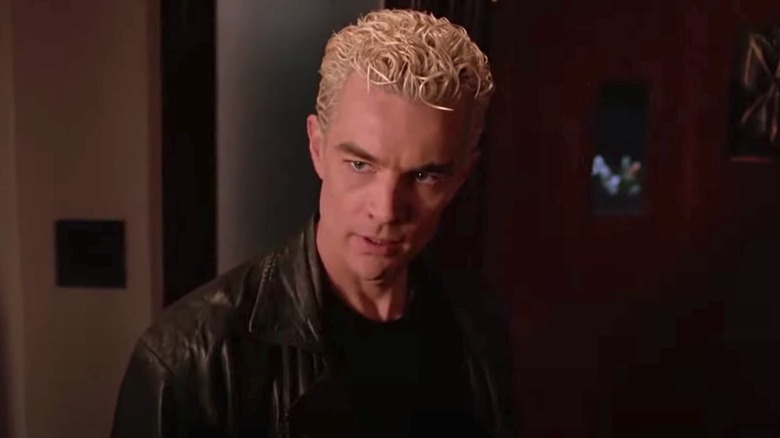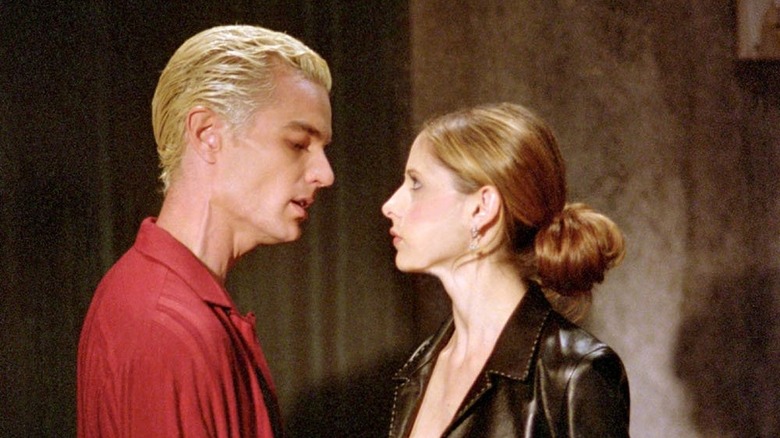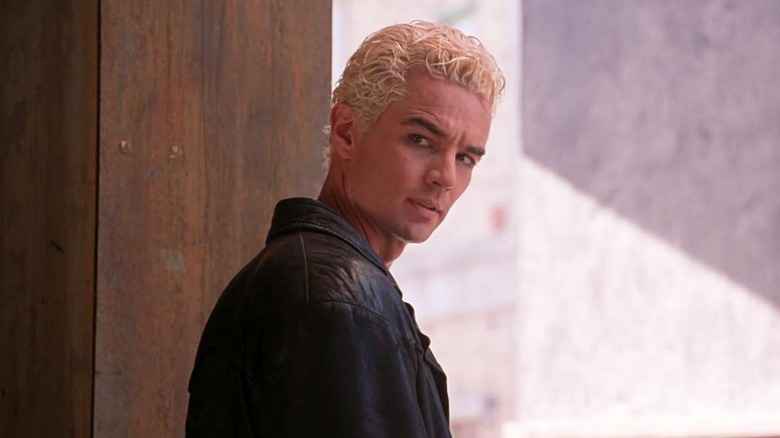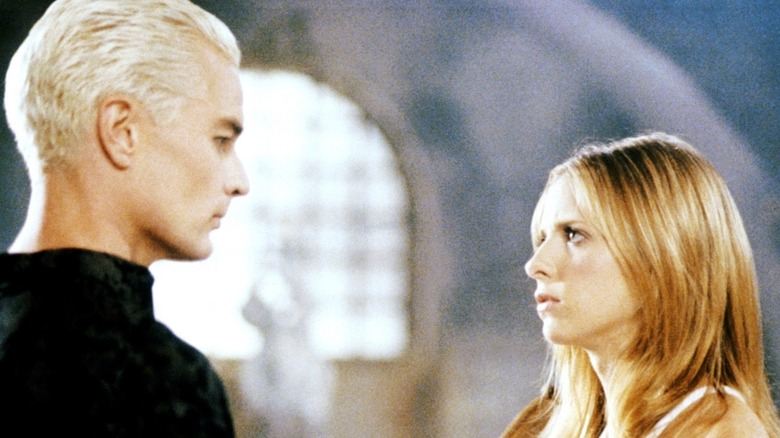James Marsters Schooled Joss Whedon On Punk Rock History While Creating Buffy's Spike
One of the most beloved characters on "Buffy the Vampire Slayer" is Spike, a punk rock vampire who falls in love with the Slayer he set out to kill. Spike was a hugely charismatic force and, despite series creator Joss Whedon's best efforts, he quickly became a romantic character. The British bad-boy was supposed to be killed off immediately, but he became such a fan favorite that the writers had to figure out what to do with him for the rest of the series. The audience loved Spike because he wasn't just a misfit among misfits — he owned it. From his slick-back blond hair to his leather trench coat, Spike was everyone's favorite outcast.
James Marsters was originally only supposed to play Spike for 5 episodes, the actor explained in a 2012 interview. Keeping the punk rock vamp in the series challenged the central message of the show, so the series creator was very reluctant to let Spike stay alive.
"To Joss [Whedon], vampires were supposed to be ugly, evil, and quick to be killed," Marsters went on. "He got talked into one romantic vampire by his writing partner David Greenwalt and that was Angel. Of course Angel took off like a rocket and when I was cast Joss did not imagine me to be popular; Spike was supposed to be dirty and evil, punk rock, and then dead."
But Spike was so punk rock that the audience insisted on seeing more of him, and so alive he stayed. Marsters gave a compelling performance that pulled the audience in from day one and kept their attention for the rest of the series on a character that was designed to be disposable. The actor was able to play an outsider so well because he had a long history of being one himself.
Whedon wanted to base Spike on Sid Vicious
When Whedon wrote Spike, he wanted to shape him after a punk rock icon. The first one that came to mind was Sid Vicious, the bassist for the Sex Pistols who was famously accused of the murder of his girlfriend Nancy Spungen and passed away himself soon after of a heroin overdose. Marsters, however, had an extensive knowledge of punk rock history, and he knew that Whedon was looking to the wrong Sex Pistol for the basis of his character.
"You know, when he told me he wanted the Sid Vicious of the vampire set I told him, 'No, you don't,'" the actor recalled his conversation with Whedon in Buffy the Vampire Slayer: 20 Years of Slaying by Christopher Golden. "You don't want Sid; you want Johnny Rotten.' Sid was an idiot — he really was. [...] Johnny Lydon on the other hand — Johnny Rotten — is a frickin' genius. If you see any interview with him, he is a maniacal, fiery, subversive, and howlingly funny, and he was always the Sex Pistol that I was drawn to."
These key changes provided the outline for Spike, who turned out very similar to Marsters' description of Johnny Rotten. Spike's razor-sharp wit and edgy outsider status made him one of the most beloved characters in the series — even though he wasn't supposed to be.
Marsters knew Johnny Rotten was a better fit
Marsters is certain that the "Buffy" audience falling in love with him was "an accident," but he understands why it happened that way, even if Whedon never saw it coming. "Buffy was written about and for people who are on the outside," he explained in a 2012 interview. "It was not written for the Cordelias of the world. It was not written for the popular kids in high school, it was written for the not-popular kids, which is basically the 99%. Spike, because the character endangered Joss' theme, was pushed to the outside of a group of outsiders."
The series creator trying to make the audience despise Spike only made them fall more in love with him. He embodied everything that made them fans of the show: he was quippy, he was subversive, and he didn't fit in. "[Whedon] did not want you guys to like me and that created a situation where the character was a true outcast because the author really didn't like the character," Marsters continued. "It was nothing he planned on but he created the uber-outsider, which spoke to the audience in a deep way."
The season 5 episode "Fool for Love" illuminates Spike's long history as an outsider, which began before he was even a vampire. In his human years, he is chastised by his fellow Victorian aristocrats for being a terrible poet. As a vampire, he is still a beta to Angel's alpha. At the turn of the century, William the Bloody exchanges his posh accent for a cockney one and renames himself Spike. In the 1970s he comes into the look we all know and love: his hair is bleached, his eyebrow is pierced, and he acquires his signature leather duster by killing a Slayer.
The actor was an original punk rocker
Spike felt like an authentic outsider partially because Marsters truly did grow up as a punk rocker and a geek. He even cosplayed Spock from "Star Trek" as a young teenager. "I was at the very first 'Star Trek' convention in the world in the mid-'70s in Oakland, California," he continued, adding that he "was not popular in school at all. I think it was junior high and I was a nerd. That was one of the first times I can remember of feeling accepted."
When Marsters finally owned his outsider status, he ended up finding social success for the first time in his life. "Later in high school I was a punk rocker and I specifically did not want to be accepted, I wanted to be on the outside," the actor went on. "I was wearing Chinese slippers and Zoot suits and suddenly I was popular, but I don't know why."
Despite his newfound popularity, he continued to feel an affinity for communities of weirdos, whether it be at sci-fi conventions or festivals like Burning Man. Being an outsider himself allowed him to connect to "Buffy" and the feminist message of the series, which challenged patriarchal standards.
"I think that both Joss [Whedon] and I are by nature subversive artists," he told Christopher Golden. "I produced a lot of theater that was subversive. I really enjoy subversive art; it's my favorite stuff. [...] 'Buffy' was subverting the idea that females can't defend themselves. Another part of subversion is undercutting the powerful."
The actor's "subversive" nature also allowed him to connect with his character. "[Whedon] hired a real original punk rocker to play a punk-rock vampire," Marsters added. From his authentic punk background to the romantic spin he put on the character, Marsters made Spike an irresistible part of the series.



